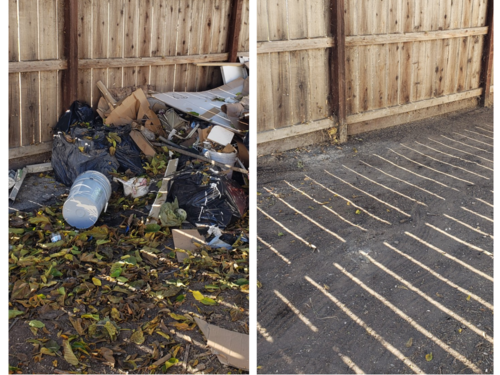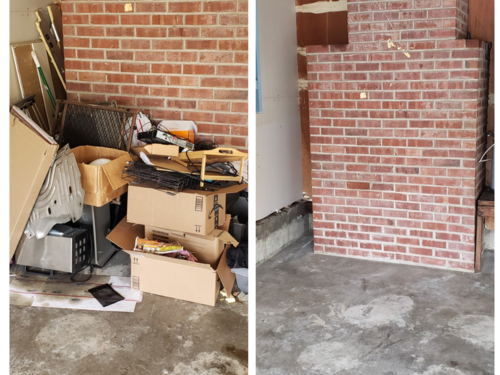The Unsung Heroes of Cleanliness: Unveiling the Grit Behind Junk Removal
Ever wonder what happens to that old recliner that’s seen better days, the dusty boxes overflowing from a recent move, or the mysterious clutter lurking in a forgotten corner? We often take for granted the seamless disappearance of unwanted items, but behind that magic act are the dedicated individuals who tackle the often-unseen world of junk removal. Meet Jim Riddle, a pragmatic entrepreneur whose journey took an unexpected turn from the realm of computer networking to the hands-on reality of hauling away unwanted goods. As Jim put it with a touch of humor, "I don't usually do, I think this is probably my second Zoom meeting in my lifetime, so." This down-to-earth approach is the essence of his story – a testament to recognizing a need and diving in, even if it means trading circuit boards for heavy lifting. His initial motivation wasn't just about making a buck; it was rooted in a genuine desire to improve his community. "I saw a need in my area for junk removal," Jim explained, "There wasn't a lot of people doing it at the time, and I figured it was a good way to help people, hopefully it helped with people illegally dumping in my area." This sense of purpose adds a layer of depth to the often-overlooked junk removal business, revealing the unsung heroes who contribute to our neighborhoods' cleanliness and well-being, like the team at Haul Done.

From Networking Cables to Hauling Heavy Loads: Jim's Entrepreneurial Pivot
Before he was navigating overflowing garages and cluttered attics, Jim Riddle was immersed in the world of computer networking. It was a stable career, but the allure of being his own boss and carving his own path proved stronger. This desire to take control led him to explore starting a business. "I decided to go into business for myself and not to basically be my own boss, and not work for anybody else," Jim recalled. His entrepreneurial vision wasn't born out of complex market analysis but from observing a tangible problem in his local area. He noticed the unsightly issue of illegal dumping and recognized an opportunity to provide a valuable service. His initial resources were modest, to say the least. "I had a suburban that I started out with," Jim shared, highlighting the humble beginnings of many successful ventures. But his commitment was anything but small. In a move that underscores his dedication, Jim made a significant sacrifice to fuel his dream. "Eventually sold my Porsche 911, my baby, to basically get like a truck," he revealed. This bold decision demonstrates the passion and willingness to invest that often characterizes those who succeed in small business success. His initial "business plan" was refreshingly straightforward, a testament to his practical nature: "I wrote down on a piece of paper, start a business. Get a website, a business license, insurance, a Google listing and start hauling junk." This no-nonsense approach offers an inspiring lesson for anyone contemplating starting a business: sometimes, the most direct path is the most effective.
Navigating the Landfill of Challenges: Key Turning Points
The journey of entrepreneurship is rarely a smooth ride, and Jim's experience in the junk removal industry is no exception. Over the years, he’s encountered his fair share of hurdles, each shaping his approach to business. Initially, operating with a Suburban and an old trailer presented logistical challenges, requiring him to gradually reinvest in more suitable equipment like a dedicated truck and even a tractor for larger jobs. However, a significant turning point was the dramatic increase in competition. "When I first started hauling junk back in 2014, when I would go to the dump, the minimum price was $5," Jim recounted. "And now the minimum price is $45." This tenfold increase in disposal costs, coupled with a surge in competitors – from a mere three to nearly 100 – forced him to adapt and find ways to maintain his competitive edge. The rise in competition, particularly after the COVID-19 pandemic, presented another challenge. "When COVID hit, I guess everybody was looking for work to do, and a lot of people got into the junk hauling business at that time as well," Jim observed. He also had to navigate the reputational challenges associated with unethical operators in the industry. "I know one of our competition, they got busted last year for illegally dumping in an orchard," Jim shared, underscoring the importance of ethical practices in building a sustainable small business. Finally, the seasonal nature of the business, with summers being significantly busier than winters, required careful financial management and strategic planning. These challenges weren't roadblocks but rather opportunities for Jim to refine his business model and reinforce his commitment to quality and integrity.

Wisdom from the Waste Stream: Lessons Learned and Innovative Practices
Through years of hauling and navigating the ups and downs of the junk removal business, Jim has gleaned invaluable insights that offer practical guidance for anyone in small business or considering starting a business. One key takeaway is the power of simplicity in the initial stages. His straightforward business plan proves that sometimes, a clear, concise vision is more effective than an overly complex one. As the business grew, Jim recognized the importance of reinvestment. Upgrading from a Suburban to a truck and eventually acquiring a tractor allowed him to tackle larger and more diverse jobs, demonstrating the need for adaptability and strategic investment in equipment. However, the cornerstone of Jim’s success lies in his unwavering commitment to customer service. "Well, I think the biggest part of it is being on time," Jim emphasized. "And, you know, providing a good price and sweeping up after we've cleaned up the mess or raking and, going around, even picking up the little bits of trash sometimes on the ground." His innovative "payment after 100% satisfaction" policy is a testament to his confidence in his service and his dedication to building trust. "I've had customers trying to pay me before the job, I tell them, no, I'm sorry, we don't accept payment until we're completely done, because we want to make sure that you're 100% happy," Jim explained. This focus on exceeding customer expectations has been instrumental in fostering repeat business and strong word-of-mouth referrals, crucial for small business success. Jim's decision to focus solely on junk removal rather than expanding into moving services highlights the importance of specialization and understanding the specific insurance and equipment requirements of different services. Finally, his preference for managing increased workload with longer hours rather than rapid expansion demonstrates a commitment to maintaining quality and cost-effectiveness for his customers. These lessons from the "waste stream" offer tangible benefits for aspiring entrepreneurs seeking to build a sustainable and customer-focused business.
More Than Just Trash: Defining the Business's Edge
In a competitive landscape, having a unique selling point is crucial for standing out. Jim’s junk removal business has carved its niche by focusing on several key differentiators that resonate with customers. Foremost is his deep-seated commitment to responsible disposal. Unlike less scrupulous operators, Jim prioritizes donating, reusing, or responsibly disposing of items at designated facilities. "It's very, very rewarding knowing that we're disposing of stuff responsibly," Jim shared, contrasting his approach with the issue of illegal dumping he initially sought to address. This ethical stance appeals to environmentally conscious customers and builds trust. His unwavering emphasis on customer satisfaction is another significant differentiator. The "payment after 100% satisfaction" policy isn't just a slogan; it's a core principle that ensures customers feel valued and confident in the service they receive. The meticulous attention to detail, going beyond simply hauling away junk to include sweeping and raking, further enhances the customer experience. "Always having the customer check the area where we hauled from to make sure they're 100% happy before we get paid," Jim emphasized. The longevity and reliability of his business, operating successfully since 2014, also provide a sense of security and trust for customers in a market where many fly-by-night operations exist. "We've been in business since 2014," Jim stated proudly. By consistently delivering on these unique selling points, Haul Done has built a loyal customer base and established a strong reputation in the junk removal industry.

From the Trenches to the Aspiring: Advice for Future Entrepreneurs
Having navigated the challenges and triumphs of building a successful junk removal business, Jim Riddle offers valuable, grounded advice for those considering starting a business. His first piece of advice is to identify a genuine need in your community, just as he did with the issue of illegal dumping. Don't overcomplicate the initial stages; Jim’s simple business plan demonstrates that a clear, basic framework can be enough to get started. However, he strongly emphasizes the paramount importance of customer service. "Well, I think the biggest part of it is being on time...providing a good price and...sweeping up after we've cleaned up our mess," Jim advised. Building trust through transparent and customer-centric practices, like the unique payment policy that Haul Done employs, is crucial for long-term small business success. Aspiring entrepreneurs in physically demanding industries like junk removal should be prepared for the hard work involved. "Oh, yeah, definitely a lot of physical labor," Jim affirmed. He also stresses the importance of understanding the specific requirements of your industry, including licenses and, crucially, adequate insurance. "You always got to be insured," Jim cautioned, highlighting a critical aspect that many short-lived businesses overlook. Be prepared for competition and the inevitable fluctuations of the market. Finally, Jim’s experience underscores that what might seem like a straightforward business on the surface requires dedication, attention to detail, and a genuine commitment to serving your customers well. His journey offers practical and relatable insights for anyone venturing into the world of entrepreneurship.
The Enduring Drive: Finding Purpose in the Pickup
Jim Riddle’s story is a compelling reminder that entrepreneurship can blossom in unexpected corners, driven not just by profit but by a genuine desire to solve problems and contribute to the community. His journey from the tech world to the gritty reality of junk removal showcases the adaptability and resourcefulness often found in successful small business owners. His unwavering dedication to ethical practices and exceptional customer service highlights the enduring power of integrity in building a sustainable and reputable business. While the work may be physically demanding, the satisfaction Jim derives from responsibly clearing unwanted items and earning the trust of his customers is palpable. "It's very, very rewarding knowing that we're disposing of stuff responsibly," he shared. His story encourages us to look beyond the surface of seemingly ordinary industries and recognize the dedication and purpose of the individuals who power them. It’s a testament to the fact that finding your niche and focusing on genuine value can lead to lasting success and a sense of fulfillment, one pickup at a time.
You can learn more about Jim Riddle and Haul Done at http://www.hauldone.com/
 Add Row
Add Row  Add
Add 



Write A Comment